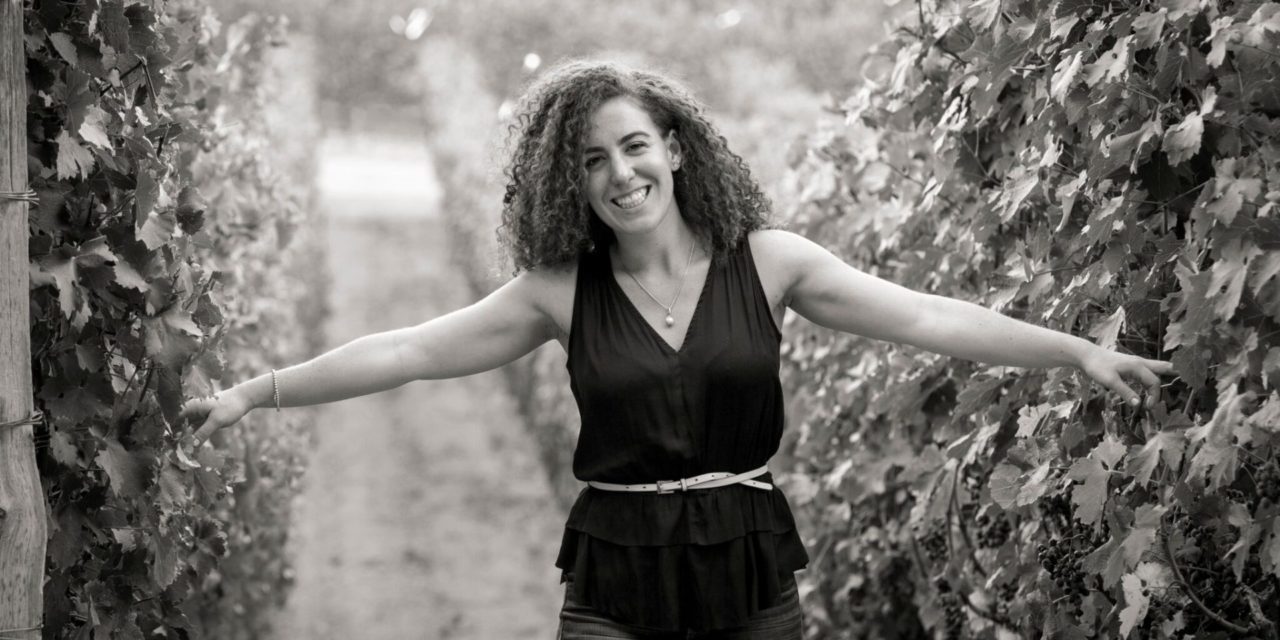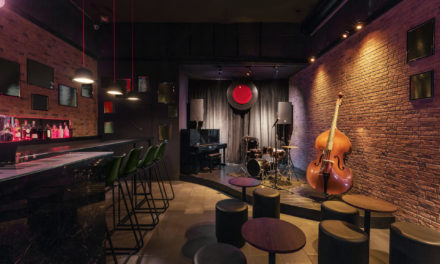Sisyphus has nothing on women in the wine industry, who’ve been rolling barrels up hills for centuries in a bid for equity. With the exception of blazing icons (the early 19th- century Champagne Widows and California’s Hanna Weinberger come to mind), the wine business was almost exclusively dominated by men until the 1960s.
Since then, progress has been made, but is still slow, and the data sets tracking and analyzing the progress up Mt. Patriarchy are hard to come by. Here’s what we do know: As of 2018, only 10 percent of California’s producers had a woman winemaker, and only 4 percent were owned by women, according to Santa Clara University’s research. (In comparison, 6.6 percent of the people running Fortune 500 lists are female.)
Given those numbers, it’s extraordinary how much women shape how (and what) wine is produced. Some of this is due to consumer buying patterns. Female consumers buy most of the wine in retail stores and restaurants, and drive trends. They like organic, and in the past decade the number of organic vineyards has tripled worldwide, according to ProWein; they like rosé, and between 2015 and 2018, the sales of rosé wines grew 1.2 million cases to 18.7 million, according to Shanken’s Impact Databank.
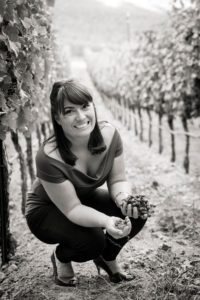
Alycia Mondavi
Sure, most of the winemakers farming organically and cranking out rosé are still male, but women are driving the trends. The Robert Parker era of big blustery fruit bombs, made on an industrial scale, is over, replaced by the Jancis Robinson era of lighter, fresher, more subtle and mineralic wines, made on a small, sustainable scale.
We spoke with several female winemakers, who’ve been quietly redefining wine culture inside the bottle for years, and about how they’re helping their staffs and their communities contend with coronavirus, a pandemic that’s killed tens of thousands of people across the world, and is slowly changing how we live, love and, yes, drink wine.
Aloft and Dark Matter Wines; Napa, Calif.
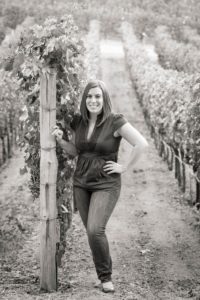
Riana Mondavi
Redefining Wine: When Giovanna, Riana, Alycia, and Angelina Mondavi’s grandfather, Peter Mondavi Sr. (a legendary figure in American wine who died at age 101 in 2016), greeted their births, he welcomed them into the family, but never even considered bringing them into the biz. “My grandfather was born into an era where men took over the business,” says Alycia, CEO of Aloft and Dark Matter Wines. “But my sisters and I loved wine, and started working in the winery at age 10 for $0.25 an hour in various capacities.
“It was wild to witness the transition in his thought process as he saw our work. By the time he died, he was the biggest advocate for women around, and claimed that women’s palates are better, making us capable making superior wine.”
In addition to transforming their grandfather’s paradigm, the four sisters decided to branch off from the family business and create their own brands (Angelina is their winemaker, Rianna is client and guest relations, and Giovanna spearheads sales and client development), while still honoring the legacy of their forebears. In recent months, they’ve found themselves on frontlines of several cultural battles. Most recently, Alycia, who sits on the Napa Valley Vintners board of directors, was in Washington, D.C., schooling lawmakers on the impact tariffs could have on the wine industry. “If we’d only known what was coming,” Alycia says ruefully.

Angelina Mondavi
Contending with Coronavirus: “It’s too early to see how this situation will shake out for the industry,” she says. “For now, we’re focusing on actions that can directly benefit the winemakers in Napa, and also healthcare workers.”
As a board member of Napa Valley Vintners, she helped lead the rollout of library cellar offerings, whereby every member is offering back vintages. At Aloft and Dark Matters, they’re in the midst of organizing a benefit for paramedics and doctors. It may come in the form of bottle sales that will benefit organizations, or they may launch an event. Stay tuned.
Brooks Wine; Amity, Ore.
Redefining Wine: In 2004, Brooks’ founder Jimi Brooks died unexpectedly, at the age of 38, the night before the winery’s crush was to begin. In a moment that seems like yesterday to many in Oregon, a dozen winemakers reported to their friend’s winery, hauled in his fruit, and made the wine. His sister, Janie Brooks Heuck, then left her successful business career in California, to manage the winery on behalf of her 8-year-old nephew, Pascal, suddenly the youngest winery owner in the U.S.
Heuck has done so much more than simply follow in her brother’s footsteps; she’s created an audacious new path for the business, one that honored his legacy while establishing her own. In 2019, Brooks became a Certified B Corporation, and partnered with 1% For the Planet, meaning that 1 percent of gross revenues will directly benefit a nonprofit. She also worked to strengthen the reputation of biodynamically-farmed wines and increase the production from 3,500 to 20,000 cases, earning accolades and awards in the process.
Contending with Coronavirus: In addition to the free ground shipping, local delivery, and curbside pickup of wine many are offering, and her ongoing dedication to organic agriculture and giving back to causes around the globe, Heuck is focusing on the people in her immediate orbit. She’s committed to keeping everyone in her staff on board and employed despite tasting room shutdowns, which don’t, as of yet, have an expiration date.
She’s philosophical about it, seeing it as an opportunity for both the employees and the winery. “We’re working to transition their multifaceted experience on our team into different roles in the vineyard,” she says. And she’s staying engaged with the community by sharing family recipes from staff members on social media under the hashtag #brookspantrychallenge, using pantry essentials with Brooks wine pairings in mind.
Tenuta Sette Cieli; Livorno, Italy
Redefining Wine: Tenuta has been pioneering cutting-edge ecological efforts in Italy since 2001. The grapes are farmed organically, and biodiversity and natural pest management are encouraged. But they go beyond that, teaming up with the University of Pisa to harvest ambient yeast found at the winery and use it to develop a completely natural, but consistently behaving yeast in their production, and therefore a more stable final product.
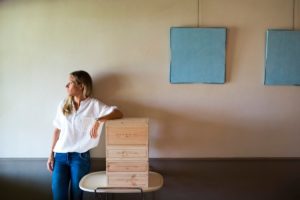
Elena Pozzolini
The winery’s commitment to diversity goes beyond encouraging wild plants to flourish in vineyard rows, and the placing of beehives around the property. “For us, the social fabric we weave at the winery is just as important was the work we do in the vineyard,” says Elena Pozzolini, CEO and winemaker. “Our workers come from far away: Romania, Senegal, other regions of Italy, Brazil, and when we built our team we intended to create a global feel on a local level.”
Contending with Coronavirus: To support the community of workers it’s nurtured in the vineyard, the winery is keeping everyone on staff. “Right now, the team is continuing on long-term projects in the vineyard, whereas the people who typically worked in the office are at home,” Pozzolini says.
“We believe our vineyard and winery has magic, and that comes from our connection to the environment and the team of workers from across the globe that we decided to build seven years ago.” They’ve worked to create unity in diversity, an emblem of the empathy and cooperation the world is capable of, practically and philosophically, and Pozzolini says that the coronavirus has only strengthened their resolve.
Domaine Jones; Languedoc-Roussillon, France
Redefining Wine: An Englishwoman by birth, Katie Jones moved to the remote mountain village of Tuchan in France more than 20 years ago—and promptly fell in love with everything impractical, unscalable, unsellable, and obscure in the wine world. In 2008, after working at coops, she bought her first vineyard.
“To say I look for vineyards no one else wants would only be a slight exaggeration,” she admits, adding that she adopts parcels like unphotogenic stray animals. Today, she owns 14 micro plots of old-vine, high-maintenance grapes across 18 miles. But her parcels of low-yield macabeu and carignan gris, hand-picked from steep slopes, earned her a serious cult following, as did her work ethic.
In addition to building a brand made from grapes most people have never heard of, she does things like convert trade sheds into a practical, if far from luxurious, working winery. Despite marauding wild boars and forest fires, she persevered. In 2012, saboteurs at ProWein poured out her entire 2012 vintage of Jones Blanc, made from grenache gris, and almost sank her business. And yet she persisted.
Contending with Coronavirus: Jones is redoubling her dedication to sustainability and community in the face of Covid-19. She and her husband are in the process of having their wines certified organic and have launched a new line of wines in honor of the move called Herbarium. She’s also using the wild herbs that grow in her vineyards to create “teas” to spray on the vines and increase their resistance to pests.
To stay connected to her village of 900, many of whom are farmers, and her friends and family in the U.K., she’s been hosting Zoom tastings paired with “Have You Met Miss Jones” wine cases (available online). During the Zoom meetings, she also shares footage from the vineyards and gives food-pairing advice so participants can keep the party going at dinner.
Zorzettig Winery; Fruili, Italy
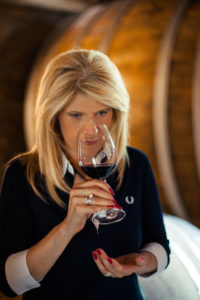
Annalisa Zorzettig
Redefining Wine: The winery’s head, Annalisa Zorzettig, has made sustainability part of the DNA of her brand. The grapes are grown in vineyards brimming with native plant species, cover crops, fruit and olive trees, and beehives to drastically reduce the need for chemical pesticides. And nothing goes to waste, even the seeds of the grapes. “The bio-residues that come from the pomace—made of skins, seeds and stems—is undervalued, but constitutes a potential source of bioactive phenolic compounds that can be used in several other industries,” Zorzettig explains.
The winery sends its pomace to a local factory, where it’s dehydrated and transformed into a phenolic-rich compound, believed to have serious health benefits and used in food and cosmetics. Zorzettig’s packaging is lightweight, the labels are eco-friendly, and production at the winery happens via renewable energy.
Contending with Coronavirus: The impact of coronavirus in Italy has been devastating; Zorzettig says she wanted to do something to support the healthcare workers who’ve been working so hard to contain the pandemic. The winery has launched a line of bottles, called “Andra Tutto Bene,” which translates into “everything will be alright,” to benefit the intensive care unit of Ospedale Universitario Santa Maria della Misericordia in Udine, in its battle against the coronavirus.
“This wine is made from the native red variety, refosco dal peduncolo rosso, well-known for being resilient,” Zorzettig says. “On the label, ‘Andra Tutto Bene’ will be printed in eight different languages. It represents the hug we cannot give anyone right now.”
The desire to stand shoulder-to-shoulder with their community is driving every decision they make. “We’re facing the moment with the farmers’ attitude—ready to stand the weather destroying the crop, and optimist that nice weather will come back with its good fruit,” she says. “Of course, the situation generated by Covid will leave a mark on our habits, but we’re confident that some Italian values and traditions will become stronger, and will be enhanced by new energy.”
I’ll drink to that.

